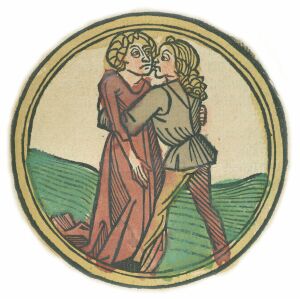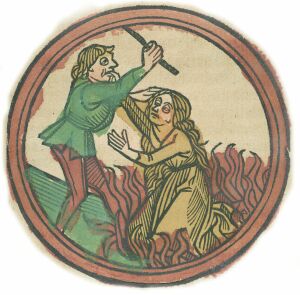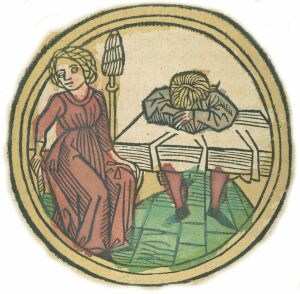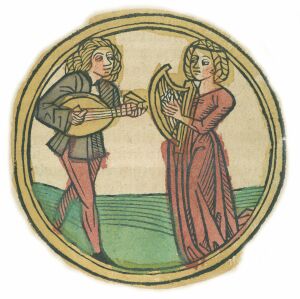|
Around 500 years before the birth of our Savior, the spirit of science
began to be applied to the practice of medicine. Where before the
ancients looked to "the gods" to explain the workings of the natural
world, Hippocrates (b. ca. 460 B.C.) urged that sine qua non of
science: observation. In the course of the studies that merited his
becoming known as "the Father of Medicine," he noticed that blood
removed from the body separates into four parts: the clear red, a
yellowish liquid that rises to the top, the dark liquid that settles to
the bottom, and whitish fluid. He and his students, especially his
son-in-law, Polybus, took these observations and developed a theory of
medicine that was to hold sway in the West and in the Islamic world for
thousands of years -- a theory further expounded upon by Galen: that
physical and mental health are a matter of a good balance of four
liquids ("humors"), all believed to be produced in the liver, but which
are found in the veins and are associated with various organs of the
body.
This theory of bodily humors 1
-- called "humorism " or "humoralism" -- holds that each person
produces all of these humors, but that the preponderance of one
relative to the others -- a condition called "dyscrasia" -- brings on
illness. Each of these humors was believed to be associated with one of
the four elements which, when combined in various proportions, make up
all things:
-
The humor of
Blood, associated with the liver and with Air, which is the hot and
moist element. A person in whom blood predominates is said to be
"sanguine," from the Latin "sanguis" (blood).
-
The humor of
Yellow Bile, associated with the spleen and with Fire, which is the hot
and dry element. A person in whom yellow bile predominates is said to
be "choleric," from the Greek "khole" (bile).
-
The humor of
Black Bile, associated with the gall bladder and with Earth, which is
the cold and dry element. A person in whom black bile predominates is
said to be "melancholic," from the Greek "melas" (black) and "khole"
(bile).
-
The humor of
Phlegm, associated with the lungs and brain and with Water, which is
the cold and moist element. A person in whom phlegm predominates is
said to be "phlegmatic," from the Greek "phlegmatikos" (abounding in
phlegm) .
The following
excerpt from the 11th c. Regimen Sanitatis Salernitanum,
attributed to John of Milano, gives the basic run-down as to the
effects
of too much of one humor or another:
 |
If Sanguin
humour do too much abound,
These signes will be thereof appearing cheefe,
The face will swell, the cheeks grow red and round,
With staring eies, the pulse beate soft and breefe,
The veynes exceed, the belly will be bound,
The temples, and the forehead full of griefe,
Unquiet sleeps, that so strange dreames will make
To cause one blush to tell when he doth wake:
Besides the moysture of the mouth and spittle,
Will taste too sweet, and seeme the throat to tickle.
|
 |
If Choller do
exceed, as may sometime,
Your eares will ring, and make you to be wakefull,
Your tongue will seeme all rough, and oftentimes
Cause vomits, unaccustomed and hatefull,
Great thirst, your excrements are full of slime,
The stomacke squeamish, sustenance ungratefull,
Your appetite will seeme in nought delighting,
Your heart still greeued with continuall byting,
The pulse beate hard and swift, all hot, extreame,
Your spittle soure, of fire-worke oft you dreame.
|
 |
If Flegme
abundance haue due limits past,
These signes are here set downe will plainly shew,
The mouth will seeme to you quite out of taste,
And apt with moisture still to overflow,
Your sides will seeme all sore downe to the waist,
Your meat wax loathsome, your digestion slow,
Your head and stomacke both in so ill taking,
One seeming euer griping tother aking:
With empty veynes, the pulse beat slow and soft,
In sleepe, of seas and ryuers dreaming oft. |
|

|
But if that
dangerous humour ouer-raigne,
Of Melancholy, sometime making mad,
These tokens then will be appearing plaine,
The pulse beat hard, the colour darke and bad:
The water thin, a weake fantasticke braine,
False-grounded ioy, or else perpetuall sad,
Affrighted oftentimes with dreames like visions,
Presenting to the thought ill apparitions,
Of bitter belches from the stomacke comming,
His eare (the left especiall) euer humming. |
Note in the above that the humors are said to affect even dreams.
Chaucer alludes to this in "The Nun's Priest's Tale" when the rooster,
Chanticleer, had a dream in which he was being pursued by a
yellowish-red hound-like creature. He wonders if the dream is
prophetic, so his wife, Pertelote, reassures him by telling him:
Certes this
dream, which ye have mette tonight,
Cometh of the great supefluity
Of youre rede cholera, pardie,
Which causeth folk to dreaden in their dreams
Of arrows, and of fire with redde beams,
Of redde beastes, that they will them bite,
Of conteke [contention], and of whelpes great and lite [little];
 Right as the humour of melancholy Right as the humour of melancholy
Causeth full many a man in sleep to cry,
For fear of bulles, or of beares blake,
Or elles that black devils will them take,
Of other humours could I tell also,
That worke many a man in sleep much woe;
That I will pass as lightly as I can.
Pertelote then
goes on to prescribe herbs for her husband to use to avoid such dreams
in the future. According to humorist theory, not only herbs, but stages
of life, colors, various activities, the zodiac,
and even geographic
location affect the production of these humors, and finding the right
herb, activity, etc., and doing things at the right time, should bring
about "eucrasia," or a state of balance. Most obviously and
importantly, foods could also affect the balance, with some foods being
hot, and others cold; some being moist, and others dry. The common
cold, for example, was believed to have been caused by a production of
too much phlegm, so fish, which is a cold and moist food, should be
avoided by such a patient lest he add to the production of the
out-of-balance humor; instead, he should partake of hot and dry foods,
such as pepper, to counteract the cold and moist phlegmatic influence. 2
The seasons, too, play a role in balancing or unbalancing the humors,
as St. John Damascene (b. ca. 676) tells us in his "Exposition of the
Orthodox Faith":
The course which
the Creator appointed for them [the planets] to run is unceasing and
remaineth fixed as He established them. For the divine David says, The
moon and the stars which Thou establishedst, and by the word
'establishedst,' he referred to the fixity and unchangeableness of the
order and series granted to them by God. For He appointed them for
seasons, and signs, and days and years. It is through the Sun that the
four seasons are brought about.
And the first of these is spring: for in it God created all things, and
even down to the present time its presence is evidenced by the bursting
of the flowers into bud, and this is the equinoctial period, since day
and night each consist of twelve hours. It is caused by the sun rising
in the middle, and is mild and increases the blood, and is warm and
moist, and holds a position midway between winter and summer, being
warmer and drier than winter, but colder and moister than summer. This
season lasts from March 21st till June 24th.
Next, when the rising of the sun moves towards more northerly parts,
the season of summer succeeds, which has a place midway between spring
and autumn, combining the warmth of spring with the dryness of autumn:
for it is dry and warm, and increases the yellow bile. In it falls the
longest day, which has fifteen hours, and the shortest night of all,
having only nine hours. This season lasts from June 24th till September
25th.
Then when the sun again returns to the middle, autumn takes the place
of summer. It has a medium amount of cold and heat, dryness and
moisture, and holds a place midway between summer and winter, combining
the dryness of summer with the cold of winter. For it is cold and dry,
and increases the black bile. This season, again, is equinoctial, both
day and night consisting of twelve hours, and it lasts from September
25th till December 25th.
And when the rising of the sun sinks to its smallest and lowest point,
i.e. the south, winter is reached, with its cold and moisture. It
occupies a place midway between autumn and spring, combining the cold
of autumn and the moisture of spring. In it falls the shortest day,
which has only nine hours, and the longest night, which has fifteen:
and it lasts from December 25th till March 21st. For the Creator made
this wise provision that we should not pass from the extreme of cold,
or heat, or dryness, or moisture, to the opposite extreme, and thus
incur grievous maladies. For reason itself teaches us the danger of
sudden changes.
Fasting during
the various seasons, such as we do during Ember
Days, helps bring the humors into balance. The Golden Legend,
written by Blessed Jacopo de Voragine (A.D. 1230-1298), Archbishop of
Genoa, gives the following as one of eight reasons for our Ember Day
fasts:
The fifth
reason, as saith John Damascenus: in March and in printemps the blood
groweth and augmenteth, and in summer coler, in September melancholy,
and in winter phlegm. Then we fast in March for to attemper and depress
the blood of concupiscence disordinate, for sanguine of his nature is
full of fleshly concupiscence. In summer we fast because that coler
should be lessened and refrained, of which cometh wrath. And then is he
full naturally of ire. In harvest we fast for to refrain melancholy.
The melancholious man naturally is cold, covetous and heavy. In winter
we fast for to daunt and to make feeble the phlegm of lightness and
forgetting, for such is he that is phlegmatic.
Interestingly,
the eight musical modes, or scales, of classical Western music are seen
by humorists to also affect the balance of humors, with the modes being
evenly divided into four groups, each group affecting one the bodily
humors:
But what is most interesting and most fun of
all to explore is the notion of how the humors affect the temperaments.
The Four Temperaments
We all have an
intuitive awareness that there are different "types" of people. This
one's "an outgoing fellow"; that one's "the quiet type." This one's
better off working with his hands while another excels at bookish
pursuits. One sort of person is a leader; another sort is a follower.
These basic dispositions, or manners of thinking, behaving, and
reacting, are called "temperaments" -- a word whose etymology reflects
humorist theory: it derives from the Latin temperamentum, which
refers to "proper mixture." Going further back, and keeping the
aforementioned words of St. John Damascene in mind, it could ultimately
stem from the Latin tempus or tempor-, which refer to
time and seasons.
Humorism asserts that each person is born with a basic temperament as
determined by which of the four humors tends to predominate in the
individual. As we all produce each humor, there will be varying degrees
of influence by each, but the effects of one is usually more evident.
In some people, the next most influential humor might be quite strong
so that such a person can be generally described as having a combined
temperament; in others, the most abundant humor dominates the others
such that there is no question at all as to which category he falls
into.
What follows is a very basic outline of the characteristics of each
temperament as classically described. For more explicit information,
you'll have to take the test linked to at the bottom of the page.

Sanguine

 Self-composed Self-composed  Not given to
worry Not given to
worry  Liberal Liberal
 Tends to follow
rather than lead Tends to follow
rather than lead  Cordial Cordial  Peaceable Peaceable
 Talkative Talkative  Not averse to
change Not averse to
change  Adjusts easily Adjusts easily
 Tends to prefer
informality Tends to prefer
informality  Aware of
surroundings Aware of
surroundings  Impetuous Impetuous
 Impulsive Impulsive  Lacking in
perseverance Lacking in
perseverance  Lacking in
initiative Lacking in
initiative
 Prone to
carelessness, hedonism, flightiness, and lust Prone to
carelessness, hedonism, flightiness, and lust
 Humor:
Blood Humor:
Blood  Element:
Air Element:
Air  Season:
Spring Season:
Spring
 Qualities: Hot
and Wet Qualities: Hot
and Wet  Planet: Jupiter Planet: Jupiter
Choleric

 Self-composed Self-composed  Not given to
worry Not given to
worry  Persuasive Persuasive  Independent Independent
 Rarely shows
embarrassment Rarely shows
embarrassment  Tends to lead
rather than follow Tends to lead
rather than follow
 Persistent Persistent  Insistent Insistent  Decisive Decisive  Dynamic Dynamic  Impetuous Impetuous  Impulsive Impulsive  Touchy Touchy
 Prone to
hypocrisy, deceit, pride, and anger Prone to
hypocrisy, deceit, pride, and anger
 Humor: Yellow
Bile Humor: Yellow
Bile  Element: Fire Element: Fire  Season: Summer Season: Summer
 Qualities: Hot
and Dry Qualities: Hot
and Dry  Planet: Mars Planet: Mars
Melancholic

 Sensitive Sensitive  Intuitive Intuitive  Self-conscious Self-conscious  Easily
embarrassed Easily
embarrassed
 Easily hurt Easily hurt  Introspective Introspective  Sentimental Sentimental  Moody Moody
 Likes to be
alone Likes to be
alone  Empathetic Empathetic  Often artistic Often artistic
 Often fussy and
perfectionist Often fussy and
perfectionist  Deep Deep
 Prone to
depression, avarice, and gluttony Prone to
depression, avarice, and gluttony
 Humor: Black
Bile Humor: Black
Bile  Element: Eartth Element: Eartth  Season: Autumn Season: Autumn
 Qualities: Cold
and Dry Qualities: Cold
and Dry  Planet: Saturn Planet: Saturn
Phlegmatic

 Peaceful Peaceful  Easy-going Easy-going  Deliberative Deliberative
 Faithful Faithful  Reliable Reliable
 Relatively
unaffected by environment Relatively
unaffected by environment  Reserved Reserved  Distant Distant
 Slow in movement Slow in movement
 Constant in mood Constant in mood
 Not prone to
worry Not prone to
worry
 Prone to
stagnation and sloth Prone to
stagnation and sloth
 Humor: Phlegm Humor: Phlegm  Element: Water Element: Water  Season: Winter Season: Winter
 Qualities: Cold
and Wet Qualities: Cold
and Wet  Planet: Moon Planet: Moon

An
exaggerated way of understanding the four temperaments is to consider
four people who see a star fall to earth. The Sanguine talks about it
animatedly to all present; the Choleric wants to form and lead an
expedition to
find it; the Melancholic ponders what it means and how
he feels about it; and the Phlegmatic waits for the others to decide
what to do as whatever decision they make is fine by him. It's kind of
fun to analyze friends -- and characters we see in movies, too -- in
terms of these four temperaments. Consider "The Wizard of Oz" with its
Sanguine Cowardly Lion, Choleric Scarecrow, Melancholic Tin Man, and
Phlegmatic Dorothy. Or "A Streetcar Named Desire" with its Sanguine
Mitch, Choleric Stanley, Melancholic Blanche DuBois, and Phlegmatic
Stella.
See the temperament test to discover your
dominant classic temperament and to learn more about your fundamental
dispositions, your bright side, your dark side, and some things you
need to know in order to make the best of who you are.3
To read more about the
four temperaments, see Fr. Christiaan Kappes's "The Four Temperaments" (PDF).
Footnotes:
1 Also spelled "humours"
2 Humorism greatly
affected medieval cuisine as cooks endeavored to prepare foods in
proper balance, for example, cold, moist fish would be served with hot,
dry spices or prepared with wine, which was also considered hot and
dry; game was considered to be dry, so was prepared in moist fats;
vinegar was considered cold and dry, so was tempered with honey, which
was considered hot and moist, etc. The goal in cooking for the ill,
however, wasn't "a balanced diet," but a diet that would counteract the
effects of the humor causing the illness.
Note that it isn't the actual temperature or actual liquidity of a food
that determines its classification as hot or cold, dry or moist; it is
its inherent quality and its effects on the body. The degrees of
hotness/coldness and dryness/moistness were often rated on a scale of 1
to 4, with 4 being the highest.
Humorist theory also affected cooking techniques: dry foods
were boiled instead of roasted, moist foods were baked instead of
boiled, and so on.
3
Just for the sake of information: The modern Myers-Briggs
Type Indicator (MBTI) classifies personalities into sixteen groups by
analyzing responses to a long questionnaire and determining where a
respondent fits with regard to four basic questions:
 Introversion
vs. Extraversion: Outer directed (E) or inner directed (I)? Introversion
vs. Extraversion: Outer directed (E) or inner directed (I)?
 Sensing
vs. Intuition: Is information processed literally (S) or abstractly (N)? Sensing
vs. Intuition: Is information processed literally (S) or abstractly (N)?
 Thinking
vs. Feeling: Are decisions made by thought (T) or feelings (F)? Thinking
vs. Feeling: Are decisions made by thought (T) or feelings (F)?
 Judging
vs. Perceiving: Is there a preference for order (J) or spontaneity (P)? Judging
vs. Perceiving: Is there a preference for order (J) or spontaneity (P)?
David Keirsey believed that those who are "Sensing" and "Judging" (SJ)
fit the classic description of the Phlegmatic. Those who are "Sensing"
and "Perceiving" (SP) are Sanguines. Those who are "Intuitive" and
"Feeling" (NF) are Melancholics, and those who are "Intuitive" and
"Thinking" (NT) are Cholerics. He gave descriptions of and new names to
the classic types -- the new names being: Artisans (Sanguine),
Rationals (Cholerics), Idealists (Melancholics), and Guardians
(Phlegmatic) -- and further broke down those groups into four
sub-groups:
-
The Sanguine Artisans: The
Performers (ESFP); The Promoters (ESTP); The Composers (ISFP); The
Crafters (ISTP).
-
The Choleric Rationals:
The Field Marshalls (ENTJ); The Inventors (ENTP); The Masterminds
(INTJ); The Architects (INTP).
-
The Melancholic Idealists:
The Teachers (ENFJ); The Champions (ENFP); The Counselors (INFJ); The
Healers (INFP).
-
The Phlegmatic Guardians:
The Supervisors (ESTJ); The Providers (ESFJ); The Inspectors (ISTJ);
The Protectors (ISFJ).
While the classic
temperaments model labels all Extraverts as either the Sanguine or
Choleric, and labels all Introverts as Melancholics or Phlegmatics,
Keirsey has Extraverts and Introverts in each group. If you take the
above test and find it doesn't quite fit you, you might enjoy taking a
test based on Kiersey's model.
|
|

